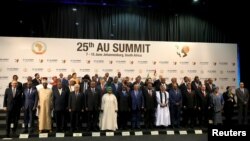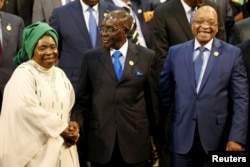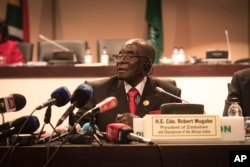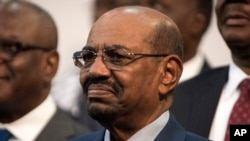Heads of state gathered for the African Union summit in Johannesburg say they made great strides in solving the continent's many problems, which include a political crisis in Burundi. But the meeting was overshadowed by the arrival of Sudan's president, wanted on genocide charges.
Although Burundi and the violence in South Sudan were discussed, the two-day meeting of African Union heads of state was overshadowed by controversy surrounding the arrival of Sudan’s president, who is the subject of an international arrest warrant for genocide.
AU Commission Chairwoman Nkosazana Dlamini-Zuma explained the decision not to arrest Sudanese President Omar al-Bashir. South Africa had argued that as a head of state attending an AU summit, he enjoyed diplomatic immunity.
“Sudan is also a member of the AU and they always attend, so I am not sure what is the fuss today. Because they always attend. If you have been in Addis [Ababa], you know that they always attend. So as the AU, there is nothing different. He always attends our summits,” she said.
Zimbabwean President Robert Mugabe, who is serving this year as AU chairman, said African countries should withdraw from the international court, because he believes it unfairly targets African leaders.
“There is the view now that we should distance ourselves from the ICC, but unfortunately the treaty that set it up was signed not by the AU, but by individual countries who thought the ICC was there for doing good, to help us try certain other cases of political violence and so on that might happen in a country, say in an election campaign. But those of them who signed the treaty are now regretting," he said.
The refusal to arrest Bashir drew condemnation from U.S. officials, although the United States is not itself a member of the court.
US position
U.S. Assistant Secretary of State for African Affairs Linda Thomas-Greenfield spoke on the summit sidelines in Johannesburg.
“Look, we continue to engage with all the countries across the continent, but also globally, to encourage them to honor the request for Bashir to be turned over to the Inter Criminal Court," she said. "There is a warrant out for his arrest. We have engaged with our colleagues here in South Africa on that issue. But we will continue to have relations with the South African government. This is not going be an issue that is going to change the nature of our relationship, but we certainly have expressed our views on this particular issue.”
And there was the Burundi issue, whose president did not attend the summit. AU officials say they have made headway on the country's political crisis.
“They call for a consensual political solution to the crisis in Burundi, which leads first to the resumption of the dialogue between all the Burundian parties within one week following the adoption of the present communiqué,” explained AU Peace and Security Council Commissioner Smail Chergui.
The AU summit will convene again early next year at its headquarters in Addis Ababa, Ethiopia.



